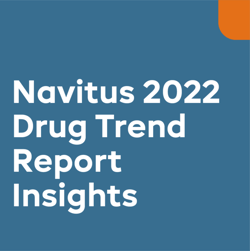Specialty medication development has grown rapidly, encompassing up to 80% of new FDA drug approvals in recent years. Read on to learn about the most important potential new specialty drugs of 2022 and beyond.

In 2020, for the first time ever, spending on specialty medications outpaced non-specialty medications. According to an IQVIA Report, specialty drugs now represent 53% of spending, a number that we anticipate will continue to grow as specialty trend outpaces non-specialty. With that in mind, keeping abreast of the latest specialty drugs is essential for plan sponsors. Here are some of the most impactful developments expected in the specialty space in 2022.
If you missed last week’s article about upcoming non-specialty drugs, be sure to check it out here.
inflammatory Bowel Disease
Inflammatory bowel disease (IBD) is an umbrella term covering two distinct diseases, Crohn’s disease and ulcerative colitis. While many patients successfully manage IBD with traditional medications, some develop difficult-to-treat disease with limited treatment options. These treatments are often costly and do not always completely manage symptoms. This unmet need has made IBD a top priority for specialty drug development. Two currently available specialty medications are expected to expand next year to treat IBD.
- The first to be approved may be Skyrizi™ (risankizumab), a subcutaneously injected IL-23 inhibitor currently used for treating plaque psoriasis. Risankizumab is expecting an FDA decision for use in treating Crohn’s disease in February 2022. It is also in ongoing trials for treating ulcerative colitis, which are expected to conclude in 2024.
- Another currently available product is Rinvoq® (upadacitinib), an oral JAK inhibitor currently indicated for the treatment of rheumatoid arthritis. It is awaiting an FDA decision for use in treating ulcerative colitis, with a decision expected in Q3 2022. Phase 3 trials for treating Crohn’s disease are ongoing, with potential filing in the near future.
- Several additional biologics are on the horizon for potential approval in 2023, including subcutaneously injected IL-23 inhibitors mirikizumab and brazikizumab, and oral S1P modulator etrasimod. All three agents are under investigation for both Crohn’s disease and ulcerative colitis.
Plaque psoriasis is a chronic skin condition largely treated with high-cost biologics. Many options covering a variety of mechanisms are now available and treatment efficacy has advanced such that complete skin clearance is now a standard goal in clinical trials. Despite these successes, more treatments continue to be developed to address various unmet needs.
- One new agent is bimekizumab, a monthly subcutaneously injected IL-17F and IL-17A inhibitor with head-to-head data demonstrating superior results compared to Humira® (adalimumab), Stelara® (ustekinumab) and Cosentyx® (secukinumab). FDA review of bimekizumab has been delayed by COVID-19 travel restrictions limiting manufacturing site inspections, so a decision is likely to be delayed until at least early 2022.
- Deucravacitinib is an oral tyrosine kinase 2 (TYK2) inhibitor, a novel mechanism closely related to JAK inhibition. Trials data for plaque psoriasis could be submitted to the FDA by the end of 2021 for a potential 2022 approval. In addition, deucravacitinib is undergoing early-phase trials for Crohn’s disease, psoriatic arthritis, ulcerative colitis and systemic lupus erythematosus.
Atopic Dermatitis
Atopic dermatitis is another chronic skin disease that is characterized primarily by skin lesions and intense itching. Most patients with atopic dermatitis are effectively treated with a variety of generic topical medications. However, some patients do not respond to common treatments or have more severe disease that requires systemic treatments. Unlike plaque psoriasis, few advancements have been made for refractory or severe atopic dermatitis since the approval of Dupixent® (dupilumab) in early 2017. This is expected to change in late 2021 and 2022, as numerous specialty products are awaiting FDA approval.
- Three of the anticipated agents are oral JAK inhibitors, including new indications for two products currently available for treating rheumatoid arthritis, Rinvoq® (upadacitinib) and Olumiant® (baricitinib), as well as a novel JAK inhibitor abrocitinib. All three agents were expected to be approved in 2021, but approvals were delayed by an FDA advisory committee meeting to discuss safety concerns for the entire drug class. Although the committee met in September, it is unclear when the FDA may make decisions on all three pending applications.
- Another new product expected in 2022 is tralokinumab, a subcutaneously injected IL-13 inhibitor. Tralokinumab has been studied in cases of moderate and severe disease, and requires injection either every two weeks or every four weeks. While the FDA was originally expected to make a decision in May 2021, the application was rejected due to an issue with the injection device. A decision on the updated application is expected in 2022.
Alzheimer’s Disease
While Aduhelm® (aducanumab) regularly made headlines throughout 2021, it is just the first of many biologic agents under investigation for the treatment of Alzheimer’s disease.
- Lecanemab and donanemab are both intravenously infused amyloid beta protein inhibitors intended to treat early stage Alzheimer’s disease, similar to aducanumab. Both agents have received breakthrough therapy designation and have begun rolling data submissions to the FDA. While it is possible that one or both agents could receive accelerated approval in late 2022, the FDA may wait until 2023 for more clinical data to become available for both products.
- Additionally, gantenerumab is expected to be the first subcutaneously administered amyloid beta protein inhibitor. However, its manufacturer is waiting for results from clinical trials and submission to the FDA may not occur until the end of 2022 or later, for a 2023 approval.
Hemophilia
Gene therapy is expected to represent a significant portion of specialty growth in the next decade, as payers and society grapple with the ramifications of paying upfront for one-time administrations that effectively “cure” chronic diseases. One disease state where gene therapy is expected to play a significant role is hemophilia.
- The first-ever gene therapy treatment for hemophilia A, Roctavian (valactocogene roxaparvovec), could be approved by late 2022. This medication is expected to cost $3 million for a one-time administration. Trials have demonstrated reductions in both bleeding episodes and the use of expensive prophylactic and on-demand treatments for five years and counting.
- The first gene therapy treatment for hemophilia B, etranacogene dezaparvovec, could receive accelerated approval in late 2022 based on an expected filing in early 2022. A competitor, fidanacogene elaparvovec, is expected to have data available shortly thereafter for potential approval in late 2023.
Hereditary ATTR-mediated amyloidosis
FDA-designated orphan drugs, medications to treat rare diseases affecting 200,000 or fewer Americans, represent the majority of drugs approved in 2020 (53%) and the largest portion (47%) of the specialty pipeline.
- One such medication is vutrisiran, a subcutaneously-injected, small-interfering RNA inhibitor of transthyretin protein, intended for use in hereditary transthyretin amyloidosis with polyneuropathy. Vutrisiran is a next-generation improvement of Onpattro® (patisiran) that allows for subcutaneous administration rather than intravenous infusion and extends the dosing interval from every three weeks to every three months.
These products represent just a fraction of the new drugs expected to be approved in 2022 and beyond.
At Navitus, we are continually monitoring the drug pipeline to help you stay ahead of the curve on new drugs that can impact your organization’s drug spend and improve your members’ health.




